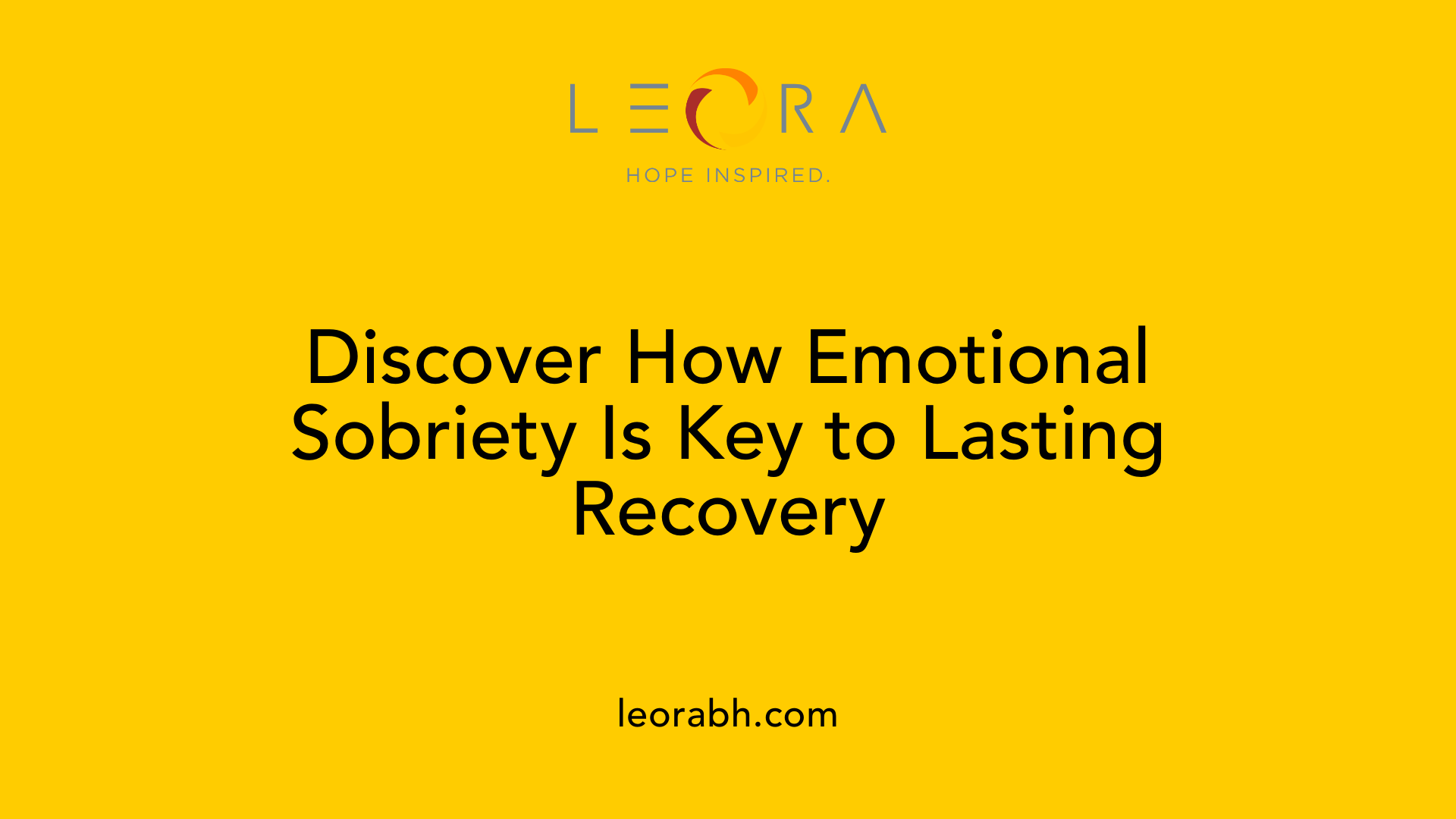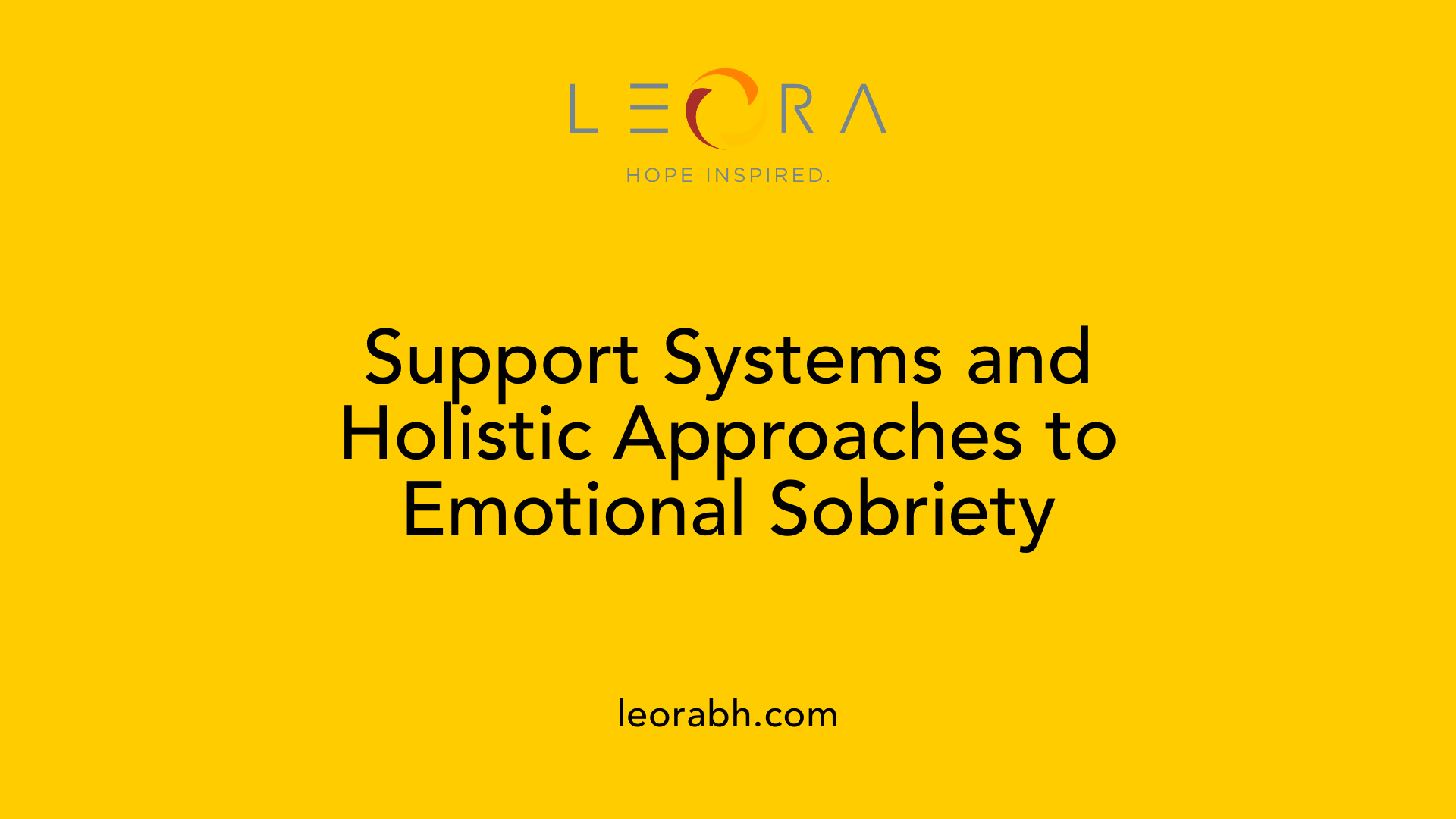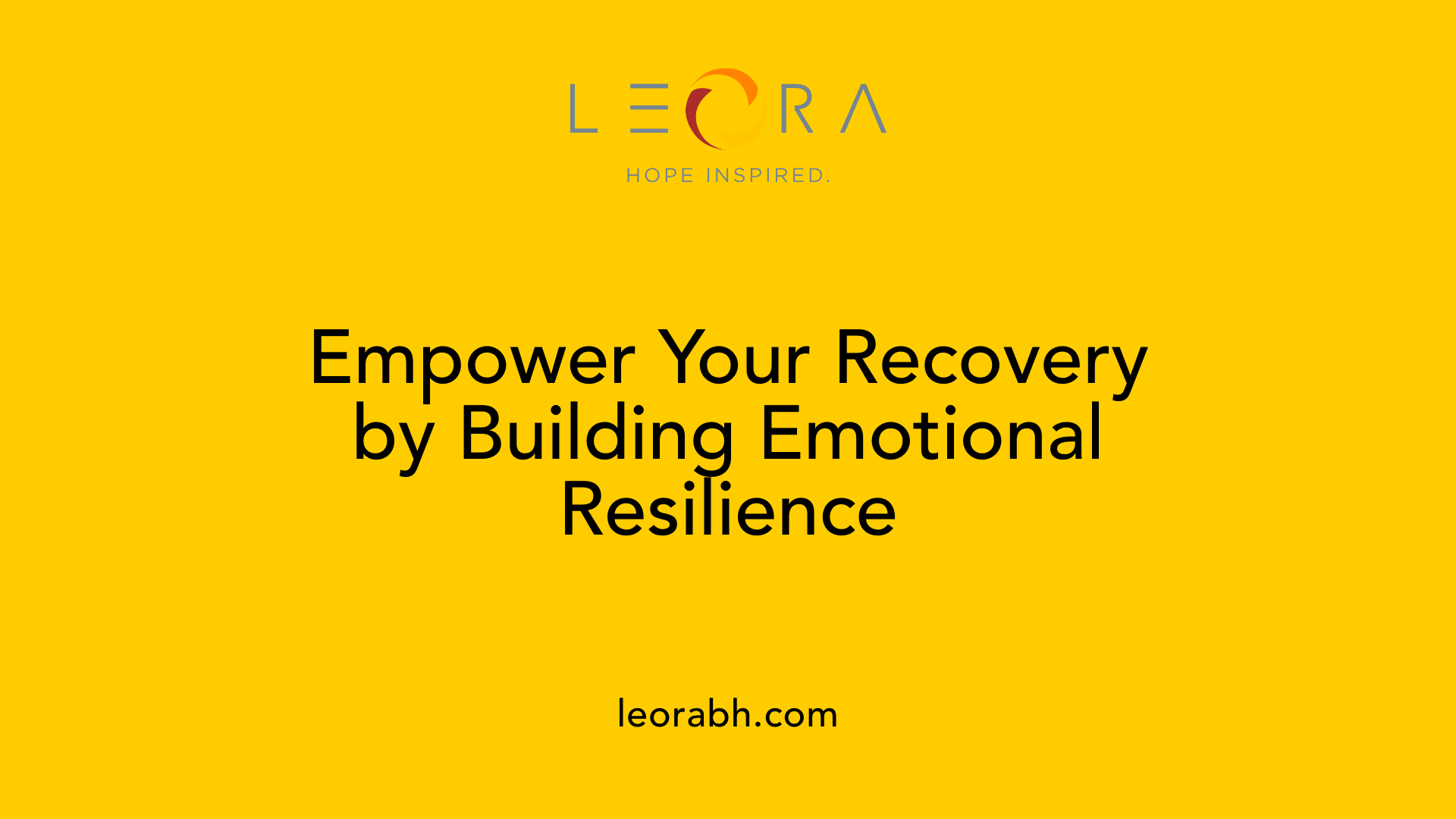Why emotional sobriety is the foundation for lasting recovery
Building Resilience and Balance in Recovery
Understanding Emotional Sobriety’s Role in Lasting Change
Emotional sobriety is a cornerstone of enduring recovery from addiction, addressing the psychological and emotional facets often overlooked in traditional treatment. It goes beyond mere abstinence, focusing on mastering emotional regulation, fostering resilience, and cultivating healthy relationships. This article explores why emotional sobriety is essential for long-term success, examining its principles, components, and practical strategies for integration into everyday life.
The Significance of Emotional Sobriety in Recovery

What is the significance of emotional sobriety in addiction recovery?
Emotional sobriety plays a crucial role in addiction recovery because it helps individuals develop emotional stability and resilience. Unlike physical sobriety, which focuses on abstaining from substances, emotional sobriety involves managing and understanding one’s emotions effectively.
When someone achieves emotional balance, they are better equipped to handle stress, setbacks, and triggers without turning to substances. This emotional regulation reduces the chances of relapse, making it a vital component for long-term recovery.
Developing emotional awareness and healthy coping skills allows individuals to process feelings like anger, sadness, or anxiety constructively. This self-awareness fosters stronger self-esteem and helps repair or build better relationships through honest communication and setting boundaries.
Practicing mindfulness, journaling, or engaging in therapy are strategies often used to strengthen emotional resilience. These tools help individuals respond thoughtfully to emotional ups and downs, rather than reacting impulsively.
Incorporating emotional sobriety into recovery supports mental health by alleviating symptoms of anxiety and depression linked to unresolved emotional issues. Moreover, it promotes a sense of purpose and personal growth, which are essential for sustaining sobriety long term.
Ultimately, emotional sobriety is about feeling connected, balanced, and capable of facing life’s challenges with clarity. It decreases relapse risks and encourages ongoing self-improvement, making it a vital goal for anyone on the path to recovery.
How Emotional Sobriety Supports Long-Term Recovery

How does emotional sobriety contribute to long-term recovery from addiction?
Emotional sobriety is integral to maintaining sobriety over the long term. It goes beyond the simple abstinence from substances, emphasizing emotional balance, resilience, and maturity. When individuals develop emotional sobriety, they become better equipped to handle emotional ups and downs, stress, and life's inevitable challenges without relapsing.
A central aspect of emotional sobriety involves fostering self-awareness and healthy emotional regulation. This means recognizing and experiencing emotions like anger, grief, fear, and joy, without resorting to substances to numb or escape feelings. Developing these skills leads to more authentic communication and healthier relationships, which are crucial in recovery.
By addressing underlying emotional issues and trauma, emotional sobriety reduces the triggers that often lead to relapse. Techniques such as mindfulness, journaling, therapy, and support groups provide tools for managing emotions constructively.
Maintaining a strong support network—including family, friends, sponsors, and community groups—further strengthens emotional stability. These relationships offer encouragement, accountability, and a safe space for sharing struggles and successes.
In addition, ongoing personal growth activities like setting meaningful goals, practicing gratitude, and engaging in creative or physical activities bolster emotional resilience. These efforts help individuals navigate setbacks and stress without reverting to substance use.
In essence, emotional sobriety empowers individuals to face life’s challenges with clarity and confidence. It promotes mental health, improves self-esteem, and builds the capacity to sustain recovery. Long-term sobriety is reinforced by this internal emotional strength, which helps people respond thoughtfully rather than react impulsively during tough times.
In conclusion, developing emotional resilience and maturity through consistent effort and support is essential for lasting recovery. It enables individuals not only to stay sober but also to lead fulfilling, balanced lives free from emotional chaos and dependency.
Core Principles and Components of Emotional Sobriety
What are the components and principles of emotional sobriety?
Emotional sobriety goes beyond simply abstaining from substances; it involves cultivating a healthy emotional life that supports long-term recovery. Such emotional maturity relies on several fundamental components. These include emotional awareness — recognizing and understanding one's feelings; acceptance — embracing all emotions without denial or suppression; and regulation — managing emotional responses through adaptive techniques.
Practices like mindfulness, meditation, journaling, and therapy are often instrumental in developing these skills. They help individuals stay present, gain clarity about their emotions, and respond thoughtfully rather than impulsively.
The principles underlying emotional sobriety emphasize honesty, humility, and ongoing growth. Honesty involves being truthful with oneself about feelings and struggles. Humility fosters an openness to learning and self-improvement. A commitment to continuous emotional development ensures resilience against setbacks.
Central to emotional sobriety are spiritual principles and self-examination. Many recovery programs advocate for spiritual awakening or growth, aligning emotional health with moral and spiritual values. This often involves working through the emotional aspects of the 12 Steps and regularly evaluating one's emotional state and behaviors.
Achieving emotional sobriety typically begins with physical sobriety. Once abstinence is maintained, individuals work on cultivating self-awareness, managing emotions healthily, and building honest, supportive relationships. Ultimately, emotional sobriety promotes experiencing all emotions fully while responding responsibly, creating a balanced emotional foundation vital for enduring recovery.
Practical Strategies for Achieving Emotional Sobriety

What are some ways to achieve emotional sobriety?
Attaining emotional sobriety involves cultivating emotional awareness, regulation, and healthy behaviors that guard against being overwhelmed or controlled by negative feelings. It starts with accepting and recognizing a broad spectrum of emotions, including anger, anxiety, guilt, and shame, without reacting impulsively or attempting to suppress them.
One of the most effective methods is practicing mindfulness, which includes meditation, deep breathing exercises, and grounding techniques. These practices help individuals stay present and manage their emotional responses more consciously. Journaling is also a valuable tool; writing about feelings and experiences fosters reflection and self-awareness, enabling individuals to identify emotional patterns and triggers.
Professional therapy, such as Cognitive Behavioral Therapy (CBT) or Dialectical Behavior Therapy (DBT), offers tailored strategies to improve emotional regulation skills. These therapies teach coping mechanisms, help process unresolved trauma, and develop resilience. Support groups and building genuine, supportive relationships are crucial for maintaining stability, providing understanding, accountability, and encouragement.
Developing emotional sobriety is an ongoing journey that requires consistent effort in self-awareness, managing emotional reactions, and adopting healthy coping skills. Engaging in regular self-care routines, such as exercise, creative pursuits, and relaxation activities, further fortifies emotional strength. Through dedication to these practices, individuals can sustain emotional balance, which is essential for long-term recovery.
The Role of Support and Holistic Treatment Approaches

Why is emotional sobriety considered a crucial part of addiction treatment and recovery?
Emotional sobriety is vital in the journey toward lasting recovery because it focuses on the emotional and psychological health of an individual. Instead of just abstaining from substances, it emphasizes learning to manage, accept, and respond to emotions in healthy ways.
Developing emotional resilience and self-awareness enables people to handle stress, triggers, and life's challenges without relapsing. This emotional stability helps reduce feelings of anxiety or depression and builds confidence and self-esteem.
Healthy relationships and better coping skills are also fostered through emotional sobriety. By addressing underlying emotional issues and learning new techniques for emotional regulation, individuals can maintain their sobriety more securely.
Achieving emotional sobriety means being able to experience and process difficult feelings like anger, grief, or fear without turning to substances. This internal stability offers peace and emotional maturity, which are essential for long-term recovery.
Support systems—such as therapy, support groups, and holistic activities—play an important role in nurturing emotional sobriety. They provide encouragement, accountability, and practical tools that help individuals stay balanced emotionally. Overall, emotional sobriety supports mental well-being, enhances relationships, and strengthens resilience, making it a cornerstone of effective addiction treatment.
External Factors and Triggers in Emotional Recovery
Why are emotional coping mechanisms important in recovery?
In the journey to long-term sobriety, managing emotional responses to external stressors and triggers is essential. Emotional coping skills equip individuals to handle stress, societal tensions, rejection, trauma, and other challenging situations without turning to substances.
External factors like ongoing societal tensions or personal setbacks can trigger intense emotional reactions. Without proper coping strategies, these moments might lead to relapse. Therefore, developing healthy coping mechanisms becomes a cornerstone of emotional recovery.
Effective strategies include mindfulness, deep breathing, journaling, and grounding techniques. These help individuals stay present and calm during emotionally turbulent times. Support from therapy, support groups, and trusted relationships also plays a vital role in fostering resilience.
Building emotional resilience through these tools enables people to respond thoughtfully rather than react impulsively. This not only supports maintaining sobriety but also helps in healing past trauma and resolving underlying emotional issues.
Focusing on emotional regulation boosts self-awareness and promotes a balanced emotional state. When faced with rejection, stress, or societal conflicts, those with strong coping skills can manage their feelings constructively, reducing the risk of relapse and fostering long-term personal growth.
Maintaining Emotional Sobriety Amidst External Stressors

How does emotional health influence the recovery process?
Emotional health plays a vital role in addiction recovery by shaping both mental and physical healing. When emotional well-being is nurtured, individuals often feel more motivated to stay committed to their sobriety and engage actively in their treatment plans. Positive emotional states help build resilience against stress and reduce feelings of anxiety or depression, which are common triggers for relapse.
Maintaining emotional balance allows recovery efforts to be more effective, as it supports better coping skills and healthier decision-making. For example, practicing mindfulness, journaling, or grounding techniques helps individuals stay centered during turbulent times. When emotional health flourishes, it can also bolster physical health, as positive emotions strengthen immune function and reduce physiological stress markers.
Conversely, emotional distress such as overwhelming anxiety or unresolved trauma can hinder progress. Elevated stress levels cause hormonal changes—like increased cortisol—that impair recovery processes and increase vulnerability to relapse. Stress can also impair sleep, decrease motivation, and lead to unhealthy coping strategies.
External stressors, such as political uncertainty or social tensions, are particularly challenging in recovery. These situations can trigger emotional dysregulation, prompting individuals to seek relief through substances or unhealthy behaviors. Therefore, developing strong emotional resilience and effective stress management skills is essential.
Strategies like limiting exposure to distressing news, focusing on controllable factors, and building a reliable support network are beneficial. Activities such as yoga, meditation, or creative outlets serve as healthy outlets for emotional expression and stress reduction.
In summary, investing in emotional health enhances resilience and stability, helping individuals navigate external chaos without compromising their recovery. Fostering emotional maturity and resilience not only supports sobriety but also promotes overall well-being and life satisfaction.
Building Emotional Resilience and Personal Growth

What are the components and principles of emotional sobriety?
Emotional sobriety involves a combination of essential components that foster emotional health and stability. These include emotional awareness—recognizing and understanding one’s feelings—acceptance of all emotions, regulation skills to manage intense or difficult feelings, and the ability to engage in healthy coping mechanisms. Developing these components often incorporates practices such as mindfulness, meditation, journaling, and therapy to strengthen emotional insight and resilience.
The principles guiding emotional sobriety emphasize honesty, humility, and ongoing personal growth. They advocate for experiencing emotions truthfully and responsibly, without suppression or impulsive reactions. This approach promotes balanced emotional responses and reduces the risk of relapse. Many aspects of emotional sobriety are rooted in spiritual principles, especially within models like the 12 Steps, which encourage self-examination, repairing relationships through amends, and spiritual awakening.
Achieving emotional sobriety begins with maintaining physical sobriety. Once substance dependence is managed, focus shifts to cultivating self-awareness—understanding your emotional triggers and patterns. Healthy techniques, including grounding exercises, self-compassion, and seeking support through therapy or support groups, are vital. The ultimate goal is to foster resilient, honest relationships and respond thoughtfully to life’s challenges, thus maintaining stability and well-being.
Overall, emotional sobriety is about balancing emotional experiences, embracing personal growth, and aligning actions with moral or spiritual values. This ongoing process supports long-term recovery by building resilience, fostering trust in oneself, and ensuring emotional health is sustained beyond the initial stages of sobriety.
Fostering Lasting Recovery Through Emotional Stability
Emotional sobriety is the foundation upon which long-term recovery is built. It nurtures resilience, emotional balance, and healthy relationships that withstand life's inevitable challenges. Implementing practical strategies such as mindfulness, therapy, and community support, alongside spiritual growth and self-awareness, paves the way for sustainable recovery. Recognizing emotional sobriety as integral to treatment emphasizes that true recovery encompasses healing the mind and heart, fostering a fulfilling, substance-free life. As individuals cultivate emotional strength and resilience, they are better equipped to navigate future hurdles, maintaining sobriety and personal growth well beyond initial treatment phases. Therefore, fostering emotional sobriety is essential for enduring recovery and lifelong well-being.
References
- Emotional Sobriety: What It Means and Why It Matters
- How to Achieve Emotional Sobriety in Addiction Recovery
- What is Emotional Sobriety? - Everlast Recovery Centers
- Emotional Sobriety: The Key to Lasting Recovery
- Emotional Sobriety in Times of Uncertainty - Plugged In Recovery
- What is Emotional Sobriety in Addiction Recovery?
- What Is Emotional Sobriety In AA? - Oar Health
- Why Long-Term Recovery Plans Are Key to Lasting Sobriety
- Emotional Sobriety Plays a Key Component in Addiction Recovery
- Why Emotional Sobriety Is a Critical Part of Your Recovery Journey
Find Your Inner Light
Related Articles
Schedule an Assessment
Leora Behavioral Health provides comprehensive treatment services, including ambulatory detox, mental health IOP, and SUD IOP, to support your journey toward lasting recovery.
Our caring team will guide you through the admissions process and create a personalized treatment plan tailored to your unique needs. We welcome walk-ins. If you or a loved one is struggling, reach out today. We’re here to help.


.svg)




.svg)
.svg)
.svg)
.svg)
